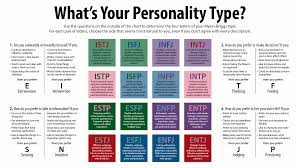Surveys and multiple-choice tests are not "science"!
I read an article online about the Myers-Briggs test. I was vaguely aware of this test and probably, at one time or another, I had to fill one out at some place of employment or another - perhaps at the Patent Office. It still is a popular test to administer and like "est" there is a company making a lot of money out of it.
But it is all bunk. Total bunk. It was based on Jungian psychology which has been thoroughly discredited. Jung decided there were "four types" of people and came up with this model after years of painstaking research, testing, and scientific study making it up based on anecdotal data and personal experiences. As Lionel Hutz might say, anecdotal data is a kind of data!
The actual test was devised by two people (who were related to each other) who had no background or credentials in psychology (such as they are) aided by an HR person they knew. It took off in the 1940s and no one bothered to ask whether it was of any value. Tellingly, psychologists today don't give it much credence, anymore than psychiatrists give credence to Freud's dream theories or his Oedipus complex theory. The best that could be said about Freud is that he was one of the founders of the field of psychiatry - even if he took off in the wrong direction.
This is not to say these fields have no value, only to point out that they are in their infancy and may be of limited value. No one, it seems, is ever cured of a mental illness or malady - at best they are drugged into complacency - and then dumped out onto the streets. At worst, it becomes a lifelong hobby for some.
The latter is what I have a real issue with. I've known a few "mentally ill" people in my life, including family members. Sadly, attempts at "therapy" seem to backfire, as they appeal to the narcissist in all of us - spend a few hours every week talking about yourself! Yea, screw other people. It seems a system designed to turn in on itself, as the "patient" is encouraged to think about themselves and their emotions and their "problems" to the exclusion of others. Perhaps a healthier path might be to think about how your actions affect other people and act accordingly.
Now granted, there are people out there who are batshit crazy - they hear voices or act out violently or simply cannot function. There are a host of others who suffer from chronic depression and rely on medications to remain stable. There is an even larger group, I believe, who are simply within one standard deviation of "normal" (whatever that is) and can be easily convinced that they have some sort of problem - be it depression, ADHD, Asperger's syndrome, or whatever was published in the tabloids this month. And this self-diagnosis of ailments and identifying as a victim of an ailment might be worse than the ailment itself.
But getting back to these bogus tests, it concerns me that whether or not someone gets a job or what job they are pigeonholed into is based in part on a deeply flawed and meaningless test - at least at some companies and government agencies.
These tests tell people what they want to hear - that they have various positive attributes that sound appealing. But they don't filter out someone as being evil or destructive - so what is the value of them?
The article above points out that the Myers-Briggs test is akin to the Barnum-Forer effect. In an "introduction to psychology" course I took in college, the professor illustrated this by having us fill out a "survey" and promising each of us an individualized "psychological profile" the next week. The next week, we each received a sealed envelope with our name on it. We opened it up and read:
- You have a great need for other people to like and admire you.
- You have a tendency to be critical of yourself.
- You have a great deal of unused capacity which you have not turned to your advantage.
- While you have some personality weaknesses, you are generally able to compensate for them.
- Your sexual adjustment has presented problems for you.
- Disciplined and self-controlled outside, you tend to be worrisome and insecure inside.
- At times you have serious doubts as to whether you have made the right decision or done the right thing.
- You prefer a certain amount of change and variety and become dissatisfied when hemmed in by restrictions and limitations.
- You pride yourself as an independent thinker and do not accept others' statements without satisfactory proof.
- You have found it unwise to be too frank in revealing yourself to others.
- At times you are extroverted, affable, sociable, while at other times you are introverted, wary, reserved.
- Some of your aspirations tend to be pretty unrealistic.
- Security is one of your major goals in life.



